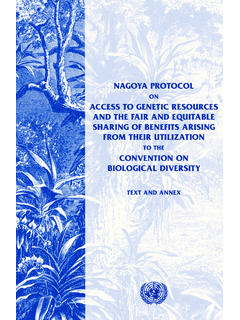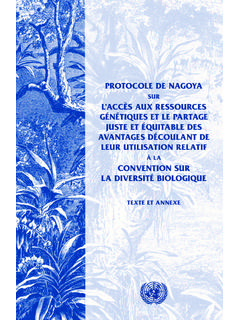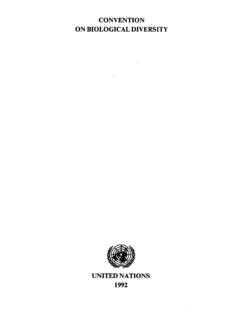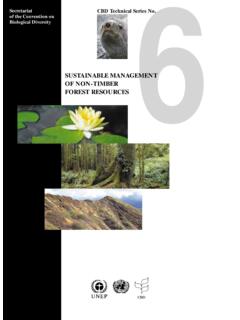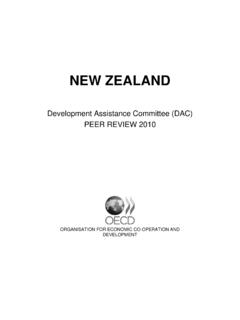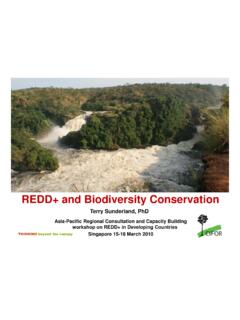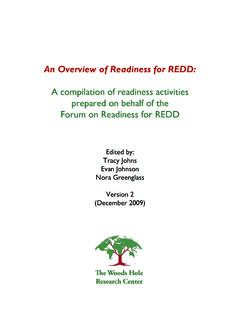Transcription of The importance of biodiversity to human health - CBD Home
1 The importance of biodiversity to human health health is our most basic human right. For most people, it does not just mean freedom from illness, but a state of overall social, emotional, physical, spiritual and cultural welfare. Being well, and having the capacity to look after our health and that of our family or community, depends upon a range of factors, including our economic status and ultimately on our environment. health is therefore one of the most important indicators of sustainable development. biodiversity is the foundation for human health . By securing the life-sustaining goods and services which biodiversity provides to us, the conservation and sustainable use of biodiversity can provide significant benefits to our health . In contrast, the continuing loss of biodiversity on a global scale represents a direct threat to our health and well-being.
2 Without a global environment that is healthy and capable of supporting a diversity of life, no human population can exist. The reports of the Millennium Ecosystem Assessment and the Intergovernmental Panel on Climate Change have highlighted how human well-being is affected by the state of the global environment and the sustainability of ecosystems . However, the enormous range of benefits which biodiversity provides to our health and well-being is largely underappreciated and unrecognised within the health community, and fails to inform critical decisions on global and regional health strategies. At the same time, the wider social and public health importance of biodiversity is not always understood by those concerned with biodiversity conservation. biodiversity supports food security, dietary health , livelihood sustainability Genetic diversity in food systems provides the foundation of crop development and food security, and promotes resistance and resilience to environmental stresses including pests and diseases of crops and livestock.
3 Diets based on a diversity of food species promote health , and can help to protect against disease by addressing the problem of micronutrient and vitamin deficiencies. Loss of agricultural biodiversity can therefore threaten health , livelihood sustainability and our future security of food and nutrition. biodiversity provides important resources for medical research Studies of wildlife anatomy, physiology and biochemistry can lead to important developments in human medicine. Examples of species of interest to medical science include bears (for insights into osteoporosis, cardio-vascular disorders, renal disease and diabetes), sharks (osmoregulation and immunology), cetaceans (respiration and treatments for divers suffering from decompression sickness) and horse-shoe crabs (optometry / ophthalmology and molecular cell biology).
4 biodiversity provides important resources for traditional and modern medicine biodiversity loss can impact on community traditions and livelihoods centred on traditional medicinal practices that utilise wild animals and plants, particularly for indigenous and local communities. Millions of people depend upon traditional medicines for their primary health care. Modern drugs derived from wild species include inter alia pain killers ( Zinconitide from cone snail toxin), cardiac drugs ( Lanoxin from Digitalis plants), anti-cancer drugs ( Taxol from Taxus trees and Hycamtin from Camptotheca t es) and treatments for diabetes (including Exanitide from Heloderma lizards). Many other potentially reimportant species are yet to be investigated or discovered. biodiversity plays a role in the regulation and control of infectious diseases biodiversity loss and ecosystem change can increase the risk of emergence or spread of infectious diseases in animals, plants and humans, including economically important livestock diseases, zoonotic outbreaks and global pandemics.
5 In recent years outbreaks of SARS, Ebola, Marburg, Hantavirus pulmonary syndrome, avian influenza and malaria have been attributed to human impacts on biodiversity , the wildlife trade or unsustainable land use change. Without a greater understanding of disease ecology, there is also a risk that programmes to tackle infectious diseases may impact negatively on biodiversity , through use of biocides and other chemicals and wildlife culls. biodiversity has social, cultural and spiritual importance within communities Ecosystem change can result in disconnection of populations from open spaces or the wider countryside, with negative implications for physical and mental well-being and loss of sense of place . This has been linked to an increased prevalence of diseases of affluence (diabetes, obesity, cardio-pulmonary illness) and psychological disorders in many communities.
6 Conversely, access to greenspace (natural and artificial) are associated with better health outcomes, shorter hospital visits and reduced convalescence time for patients than purely urban environments. An awareness of environmental values and respect for other species has been associated with reduced propensity towards anti-social behaviour in children and young adults. Conservation of biodiversity is essential for climate change adaptation Climate change will have a range of significant impacts on human health , many of which are directly associated with climate impacts on ecosystems . For example, changes in the ecology of pathogens, or in the populations or distribution of disease vectors such as mosquitoes, could lead to changes in disease patterns and increase the risk of outbreaks.
7 Loss of ecosystem services also places communities at greater risk from other climate impacts, such as extreme weather events, drought and crop failure. Intact ecosystems can reduce disaster risks and support relief and recovery efforts biodiversity and healthy ecosystems can provide important natural buffers against natural disasters such as floods, drought and landslides. Habitat loss is also a contributory factor in desertification and dryland salinity, impacting on livelihoods community stability. Those who are poor or sick, or who experience low levels of livelihood security, are likely to be at greatest risk from such events. In many regions, rural communities and the poor are typically more dependent upon ecosystems for their livelihood security and well-being, and they are therefore most vulnerable to the impact of disasters if these ecosystems are compromised before or by disaster impacts.
8 People who have been displaced by disaster or conflict may be more susceptible to illness, and more dependent on ecosystem services for food, shelter and medicine. Sustainable management of biodiversity can help to provide essential resources for promoting health and rebuilding livelihoods in post-crisis situations. About COHAB The COHAB Initiative (Co-operation on health and biodiversity ) is an international programme of work established to address the gaps in awareness, policy and action on the links between human health and well-being and the conservation of biological diversity. The Secretariat of the COHAB Initiative is based in Galway, Ireland. Visit or email for more information.
